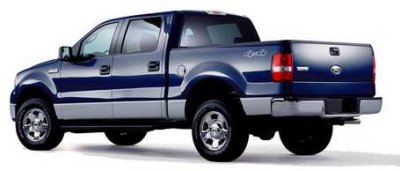Ford F150 Exhaust Videos
- 1999 Ford F150 Exhaust Systems
- 2000 Ford F150 Exhaust Systems
- 2001 Ford F150 Exhaust Systems
- 2002 Ford F150 Exhaust Systems
- 2003 Ford F150 Exhaust Systems
- 2004 Ford F150 Exhaust Systems
- 2005 Ford F150 Exhaust Systems
- 2006 Ford F150 Exhaust Systems
- 2007 Ford F150 Exhaust Systems
- 2008 Ford F150 Exhaust Systems
- 2009 Ford F150 Exhaust Systems
- 2010 Ford F150 Exhaust Systems
- 2011 Ford F150 Exhaust Systems
Ford F150 Exhaust System Tips
 The F-150 has been the best-selling vehicle in the USA for a long, long time. There are a few reasons for the F150’s popularity: they’re affordable, available in just about any configuration, very popular with fleet buyers, and they’re “Built Ford Tough.”
The F-150 has been the best-selling vehicle in the USA for a long, long time. There are a few reasons for the F150’s popularity: they’re affordable, available in just about any configuration, very popular with fleet buyers, and they’re “Built Ford Tough.”
Between the years of 1997 and 2010, Ford offered the following engines on the F150:
- A 4.2L V6
- A 4.6L V8 in a few different configurations – OHV (a.k.a. push-rod), SOHC (2V or two valve) and Ford’s modified DOHC setup (known as the 3V or three valve). All of these engines share the same basic design with their big brother, the 5.4L V8.
- A 5.4L V8, also with the same mix of valvetrains as the 4.6L (OHV or push-rod in the older F150s, with most of the 2004+ 5.4Ls having the 3 Valve design).
All of these engines will benefit from an after-market exhaust, only the 4.2L V6 will probably benefit the least. Also, adding an exhaust system to a V6 can be problematic – because combustion isn’t balanced across the block, some V6s have an exhaust note that’s more “blat blat blat” than the traditional “thrum thrum thrum” of a V8.
Because of the truck’s popularity, there are literally hundreds of after-market exhaust kits for the F150. Some of the more popular exhaust system manufacturers for the F150 are:
While none of these systems are significantly better than one another – at least that’s my opinion – people typically find that there’s a trade-off between cost and sound “quality.” I placed quality in quotes because it’s a very subjective term. A lot of truck owners want a system that sounds like a muscle-car, but they don’t want something too loud on the street, nor do they want something that has a lot of highway drone. I would call systems with drone and/or excessive noise lower quality.
Less expensive systems tend to trade cost for quality – if you invest in a premium exhaust system (like the kits from Borla), you’ll get good V8 sounds without your system being harsh or droning on the highway. On the other hand, if you go with a dirt cheap set of glasspacks, you’ll get some amazing sound at idle and thrashing noise at most other RPMs.
Of course, that’s what some people are looking for, so it’s really all in the “ear” of the beholder.
F150 Exhaust Recommendations
1. This truck is crazy popular, which means that there are lots of options. Be wary of off-brand systems trying to capitalize on the size of Ford’s market.
2. Like all trucks, knowing your wheelbase is important. Ford has offered bed lengths of 5.5′, 6′, 6.5′, and 8′ at different points during the last decade. Be sure you know what your truck’s wheelbase is before you order a cat back exhaust kit.
3. Don’t overlook Ford Racing. Sure, there systems are costly, but they are also top quality and often very nicely tuned.









I have a 2013 f 150 v6 and just wanting to change exhaust but want to hear it before commit